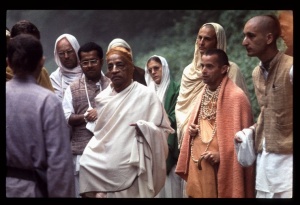SB 4.25.47: Difference between revisions
m (1 revision(s)) |
No edit summary |
||
| Line 1: | Line 1: | ||
{{info | {{info | ||
|speaker= | |speaker=Nārada Muni | ||
|listener=King | |listener=King Prācīnabarhiṣat | ||
}} | }} | ||
[[Category:Srimad-Bhagavatam - Canto 04 Chapter 25]] | |||
[[Category:Bhagavatam Verses Spoken by Narada Muni - Vanisource|042547]] | |||
<div style="float:left">'''[[Srimad-Bhagavatam]] - [[SB 4|Fourth Canto]] - [[SB 4.25: The Descriptions of the Characteristics of King Puranjana|Chapter 25: The Descriptions of the Characteristics of King Purañjana]]'''</div> | |||
<div style="float:right">[[File:Go-previous.png|link=SB 4.25.46]] '''[[SB 4.25.46]] - [[SB 4.25.48]]''' [[File:Go-next.png|link=SB 4.25.48]]</div> | |||
{{RandomImage}} | |||
==== TEXT 47 ==== | ==== TEXT 47 ==== | ||
<div | <div class="verse"> | ||
khadyotāvirmukhī ca prāg | :khadyotāvirmukhī ca prāg | ||
dvārāv ekatra nirmite | :dvārāv ekatra nirmite | ||
vibhrājitaṁ janapadaṁ | :vibhrājitaṁ janapadaṁ | ||
yāti tābhyāṁ dyumat-sakhaḥ | :yāti tābhyāṁ dyumat-sakhaḥ | ||
</div> | </div> | ||
| Line 16: | Line 22: | ||
==== SYNONYMS ==== | ==== SYNONYMS ==== | ||
<div | <div class="synonyms"> | ||
''khadyotā''—of the name Khadyotā; ''āvirmukhī''—of the name Āvirmukhī; ''ca''—also; ''prāk''—toward the eastern side; ''dvārau''—two gates; ''ekatra''—in one place; ''nirmite''—were constructed; ''vibhrājitam''—of the name Vibhrājita; ''jana-padam''—city; ''yāti''—used to go; ''tābhyām''—by them; ''dyumat''—of the name Dyumān; ''sakhaḥ''—with his friend. | |||
</div> | </div> | ||
| Line 23: | Line 29: | ||
==== TRANSLATION ==== | ==== TRANSLATION ==== | ||
<div | <div class="translation"> | ||
The two gates named Khadyotā and Āvirmukhī were situated facing the eastern side, but they were constructed in one place. Through those two gates the King used to go to the city of Vibhrājita accompanied by a friend whose name was Dyumān. | The two gates named Khadyotā and Āvirmukhī were situated facing the eastern side, but they were constructed in one place. Through those two gates the King used to go to the city of Vibhrājita accompanied by a friend whose name was Dyumān. | ||
</div> | </div> | ||
| Line 30: | Line 36: | ||
==== PURPORT ==== | ==== PURPORT ==== | ||
<div | <div class="purport"> | ||
The two names Khadyotā and Āvirmukhī mean "glowworm" and "torchlight." This indicates that of the two eyes, the left eye is less powerful in its ability to see. Although both eyes are constructed in one place, one is stronger than the other in the power to see. The king, or the living entity, uses these two gates to see things properly, but he cannot see unless accompanied by a friend whose name is Dyumān. This friend is the sun. Although the two eyes are situated in one place, they have no power to see without the sunlight. Vibhrājitaṁ janapadam. If one wants to see something very clearly (vibhrājitam), he must see it with two eyes and the assistance of his friend the sunlight. Within this body everyone is a king because he uses his different gates according to his own will. Although he is very much proud of his power to see or hear, he is nonetheless dependent on the assistance of nature. | The two names Khadyotā and Āvirmukhī mean "glowworm" and "torchlight." This indicates that of the two eyes, the left eye is less powerful in its ability to see. Although both eyes are constructed in one place, one is stronger than the other in the power to see. The king, or the living entity, uses these two gates to see things properly, but he cannot see unless accompanied by a friend whose name is Dyumān. This friend is the sun. Although the two eyes are situated in one place, they have no power to see without the sunlight. ''Vibhrājitaṁ janapadam.'' If one wants to see something very clearly (''vibhrājitam''), he must see it with two eyes and the assistance of his friend the sunlight. Within this body everyone is a king because he uses his different gates according to his own will. Although he is very much proud of his power to see or hear, he is nonetheless dependent on the assistance of nature. | ||
</div> | </div> | ||
__NOTOC__ | |||
<div style="float:right; clear:both;">[[File:Go-previous.png|link=SB 4.25.46]] '''[[SB 4.25.46]] - [[SB 4.25.48]]''' [[File:Go-next.png|link=SB 4.25.48]]</div> | |||
__NOTOC__ | |||
__NOEDITSECTION__ | |||
Revision as of 15:29, 28 May 2021

A.C. Bhaktivedanta Swami Prabhupada
TEXT 47
- khadyotāvirmukhī ca prāg
- dvārāv ekatra nirmite
- vibhrājitaṁ janapadaṁ
- yāti tābhyāṁ dyumat-sakhaḥ
SYNONYMS
khadyotā—of the name Khadyotā; āvirmukhī—of the name Āvirmukhī; ca—also; prāk—toward the eastern side; dvārau—two gates; ekatra—in one place; nirmite—were constructed; vibhrājitam—of the name Vibhrājita; jana-padam—city; yāti—used to go; tābhyām—by them; dyumat—of the name Dyumān; sakhaḥ—with his friend.
TRANSLATION
The two gates named Khadyotā and Āvirmukhī were situated facing the eastern side, but they were constructed in one place. Through those two gates the King used to go to the city of Vibhrājita accompanied by a friend whose name was Dyumān.
PURPORT
The two names Khadyotā and Āvirmukhī mean "glowworm" and "torchlight." This indicates that of the two eyes, the left eye is less powerful in its ability to see. Although both eyes are constructed in one place, one is stronger than the other in the power to see. The king, or the living entity, uses these two gates to see things properly, but he cannot see unless accompanied by a friend whose name is Dyumān. This friend is the sun. Although the two eyes are situated in one place, they have no power to see without the sunlight. Vibhrājitaṁ janapadam. If one wants to see something very clearly (vibhrājitam), he must see it with two eyes and the assistance of his friend the sunlight. Within this body everyone is a king because he uses his different gates according to his own will. Although he is very much proud of his power to see or hear, he is nonetheless dependent on the assistance of nature.